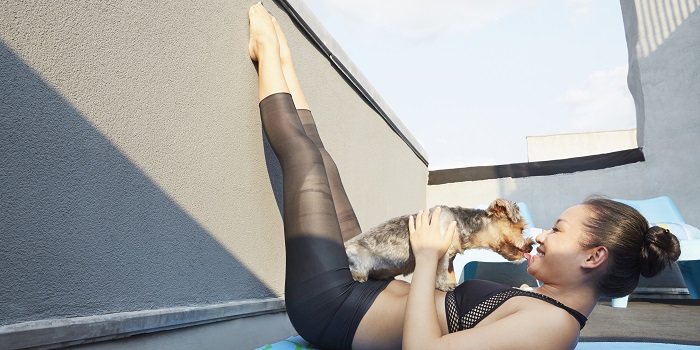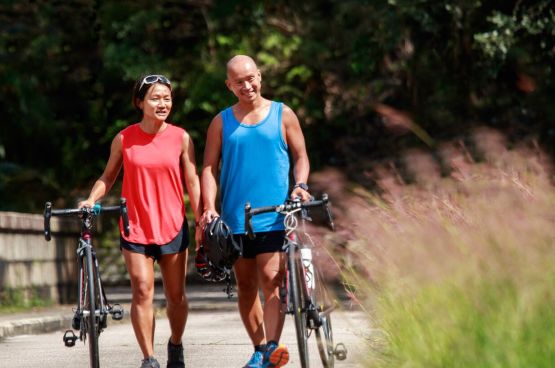Tips to get back your workout motivation
Do you sometimes wonder why you have no motivation to exercise? Maybe you find it harder to work out during the winter months. Well, you’re not alone. Losing motivation to exercise is common, but easily solved. Here, I offer some tips to help you get moving again.

What causes a lack of motivation?
As a health adviser, I’m aware that a lot of people struggle with motivation to exercise. There are lot of reasons why you might be finding it hard to be active.
- Stress and anxiety can make it harder to be more active.
- The cold and darkness of the winter months can make going outside less appealing.
- Having to manage responsibilities such as working from home or looking after children can mean that exercise gets pushed to the bottom of your to-do list.
But, getting more exercise can help boost our mood, and may make us feel less stressed. Below are my top tips for getting moving again.
How do I get motivated to exercise?
1. Set yourself realistic goals
If you’re really struggling to find motivation right now, then it might not be a good time to set yourself a huge challenge. Maybe instead you could set smaller and more achievable goals.
These might include getting out for a walk every day or going for a run twice a week. If you don’t like being outside when it’s dark, why not try home workouts? You’re more likely to stick to a plan that feels achievable, and enjoyable.
2. Celebrate the small wins
Breaking down your main goal into smaller steps is also a good way to get motivated. Maybe you would like to run 5K eventually, but your first goal could be to run 2K without stopping.
Reflecting on, and celebrating, your achievements along the way will help to keep you feeling positive.
3. Stop comparing yourself to other people
Feeling a sense of competition can be motivating, but it can also be easy to look at what other people have achieved and feel bad about our own efforts. This can make you feel very unmotivated. If this happens, try to focus on your own goals and the things you would like to achieve instead.
4. Think about the benefits
Try to think about why you want to be more active. Perhaps you want to get fitter, to spend quality time with your children or to be outside in nature. Reflect on these reasons when you are finding it hard to stick to your plan. You could even try writing them down and sticking them somewhere you see often, like the fridge.
5. Prepare for setbacks
Don’t be too hard on yourself if you lose motivation again. Try to reflect on why you’re finding it more difficult to be active and adjust your goals to meet your needs.
Are you interested in learning more about your health? Discover more about our range of health assessments.
-
Sources Sources
- What is stress? MIND. Mind.org.uk, accessed December 2023
- Wagner, Abram L., et al. "The impact of weather on summer and winter exercise behaviours." Journal of sport and health science 8.1 (2019): 39-45
- UK Chief Medical Officers' Physical Activity Guidelines. UK Government. gov.uk, published September 2019
- Join the Movement. Sport England. sportengland.org, accessed December 2023
- Obesity in Adults. Patient. patient.info, updated March 2023
- How to set goals that work. British Heart Foundation. bhf.org.uk, accessed December 2023
- Online mental health. Mind. mind.org, accessed December 2023
- Physical Training. Patient. patient.info, accessed December 2023
About our health information
At Bupa we produce a wealth of free health information for you and your family. This is because we believe that trustworthy information is essential in helping you make better decisions about your health and wellbeing.
Our information has been awarded the PIF TICK for trustworthy health information. It also follows the principles of the The Information Standard.

More exercise and fitness articles
Did you find our advice helpful?
We’d love to hear what you think. Our short survey takes just a few minutes to complete and helps us to keep improving our healthy lifestyle articles.
Legal disclaimer
This information was published by Bupa's Health Content Team and is based on reputable sources of medical evidence. It has been reviewed by appropriate medical or clinical professionals and deemed accurate on the date of review. Photos are only for illustrative purposes and do not reflect every presentation of a condition.
Any information about a treatment or procedure is generic, and does not necessarily describe that treatment or procedure as delivered by Bupa or its associated providers.
The information contained on this page and in any third party websites referred to on this page is not intended nor implied to be a substitute for professional medical advice nor is it intended to be for medical diagnosis or treatment. Third party websites are not owned or controlled by Bupa and any individual may be able to access and post messages on them. Bupa is not responsible for the content or availability of these third party websites. We do not accept advertising on this page.







